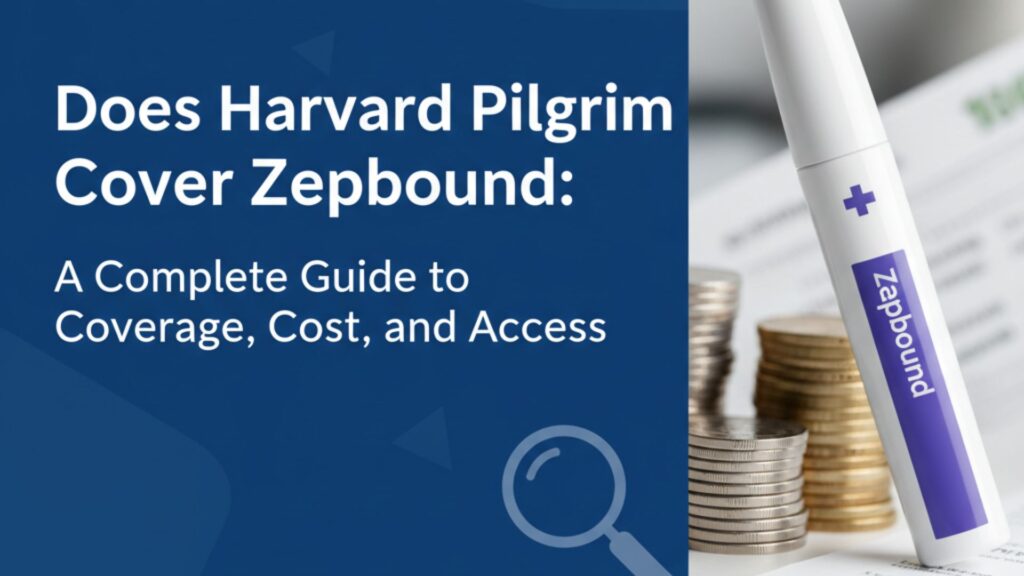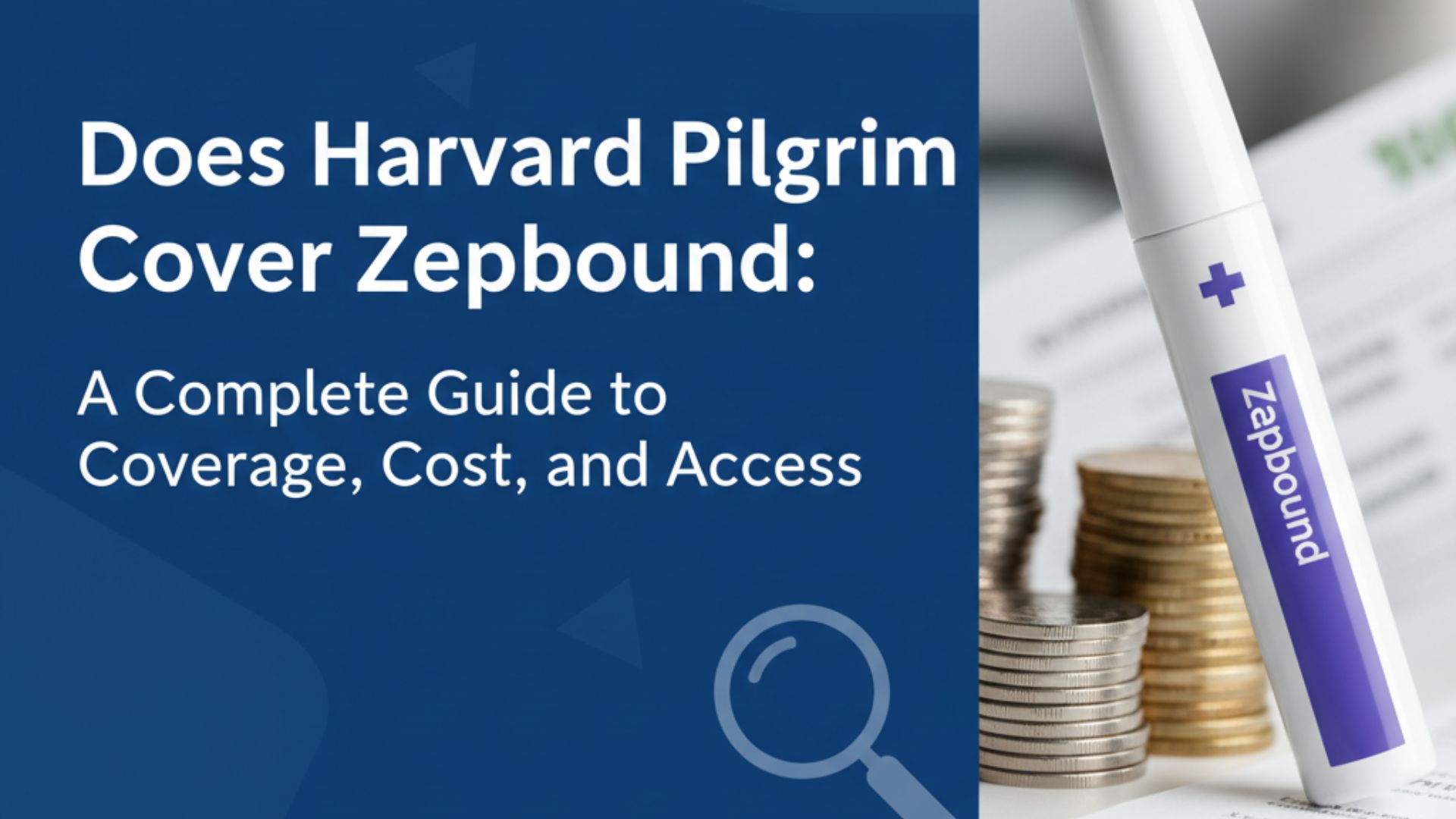Does Harvard Pilgrim Cover Zepbound: When it comes to health insurance coverage for weight management medications, many individuals and employers under Harvard Pilgrim Health Care (HPHC) plans have questions about new drugs like Zepbound (tirzepatide). As obesity management becomes an increasingly important component of preventive health, understanding whether Harvard Pilgrim covers Zepbound, and under what conditions, is essential for patients seeking affordable treatment options.

In this detailed guide, we’ll explore what Zepbound is, Harvard Pilgrim’s general policy on coverage for weight-loss medications, the process to determine your eligibility, and how to appeal coverage decisions. Additionally, we’ll provide a table of important links and resources, a FAQ section, and a comprehensive conclusion to help you make informed healthcare decisions.
What Is Zepbound?
Zepbound (tirzepatide) is a prescription medication approved by the U.S. Food and Drug Administration (FDA) in 2023 for chronic weight management in adults who are obese or overweight and have weight-related conditions such as hypertension, type 2 diabetes, or high cholesterol.
Developed by Eli Lilly, Zepbound is closely related to Mounjaro, another drug approved for type 2 diabetes management. Both medications act on GIP (glucose-dependent insulinotropic polypeptide) and GLP-1 (glucagon-like peptide-1) receptors, which regulate blood sugar levels and appetite, leading to significant weight loss when used with diet and exercise.
Overview of Harvard Pilgrim Health Care (HPHC)
Harvard Pilgrim Health Care, a part of Point32Health, is one of the major not-for-profit health insurance providers in the New England region, covering Massachusetts, Maine, Connecticut, and New Hampshire. The organization provides individual, family, and employer-sponsored health plans.
HPHC’s prescription drug coverage typically includes tiers (generic, preferred brand-name, non-preferred brand-name, and specialty drugs). Coverage for weight-loss drugs often depends on:
- The type of plan (HMO, PPO, or POS).
- Whether the medication is on the formulary (approved drug list).
- Whether the member meets medical necessity criteria.
Does Harvard Pilgrim Cover Zepbound?
As of now, coverage for Zepbound under Harvard Pilgrim Health Care plans is conditional. The medication is considered a specialty weight management drug, and coverage depends on medical necessity, prior authorization, and plan design.
HPHC may cover Zepbound if the following conditions are met:
- The patient is diagnosed as obese, with a Body Mass Index (BMI) of 30 or higher, or BMI of 27 or higher with weight-related conditions (e.g., hypertension, diabetes).
- The patient has tried and failed other weight-loss methods, including diet, exercise, and at least one other medication if applicable.
- The patient’s physician submits a prior authorization request that includes detailed medical justification.
- The plan specifically includes coverage for anti-obesity medications in the pharmacy benefit.
If your plan excludes all anti-obesity medications, Zepbound will not be covered, regardless of medical necessity.
Steps to Determine if Zepbound Is Covered by Your Plan
To find out whether your Harvard Pilgrim plan covers Zepbound, follow these steps:
- Check the Formulary (Drug List):
Visit the Harvard Pilgrim member portal or the pharmacy benefits section to search for Zepbound or tirzepatide. - Contact Member Services:
Call the number on your member ID card to confirm whether Zepbound is listed and what tier it falls under. - Ask About Prior Authorization:
Even if Zepbound is covered, your doctor will likely need to submit a prior authorization form. - Review Employer Plan Documents:
Some employer-sponsored plans may choose to exclude weight-loss medications entirely. - Speak with Your Physician:
Your healthcare provider can help prepare the required documents and medical history to justify your need for Zepbound.
How Prior Authorization Works?
If your Harvard Pilgrim plan requires prior authorization for Zepbound, your provider must submit:
- A diagnosis (obesity or overweight with comorbidities).
- BMI records from recent visits.
- Documentation of previous weight-loss attempts.
- Clinical justification for why Zepbound is medically necessary.
The insurer will then review the request and notify you of approval or denial. If denied, you may file an appeal.
Appealing a Denial
If Harvard Pilgrim denies coverage for Zepbound, you have the right to appeal. The process involves:
- Reviewing the Denial Letter: Understand the reason (medical necessity, plan exclusion, etc.).
- Requesting an Internal Appeal: Submit supporting medical documentation from your provider.
- External Review: If the internal appeal is denied, you can request an external review by an independent organization.
Persistence and detailed medical documentation increase your chances of a successful appeal.
Alternative Options if Zepbound Isn’t Covered
If Zepbound is not covered under your Harvard Pilgrim plan, consider the following options:
- Manufacturer Savings Programs:
Eli Lilly offers savings cards for eligible patients, reducing out-of-pocket costs. - Appeal with Medical Support:
Have your doctor emphasize the health risks of obesity and benefits of treatment. - Clinical Trials:
Some clinics or universities conduct studies that provide Zepbound at reduced or no cost. - Consider Covered Alternatives:
Harvard Pilgrim may cover other weight-loss medications like Wegovy (semaglutide) or Saxenda (liraglutide).
Benefits of Zepbound for Weight Management
Zepbound offers significant benefits for patients struggling with obesity, including:
- Substantial weight loss (average of 15–20% body weight reduction).
- Improved blood sugar levels in type 2 diabetes patients.
- Better cardiovascular outcomes and reduced risk factors for heart disease.
- Enhanced energy and mobility.
However, Zepbound can also cause side effects like nausea, vomiting, and fatigue, which should be discussed with a healthcare provider.
Cost of Zepbound Without Insurance
Without insurance coverage, Zepbound can cost around $1,000 to $1,300 per month, depending on dosage and pharmacy location. Even if not covered, savings programs or prescription discount services may reduce the price.
Important Links and Information
| Category | Details / Links |
|---|---|
| Organization | Harvard Pilgrim Health Care (HPHC) |
| Parent Organization | Point32Health |
| Website | https://www.harvardpilgrim.org |
| Pharmacy Coverage | Weight management drugs may require prior authorization |
| Formulary Check | Available on the Member Portal |
| Member Services Contact | Listed on HPHC member ID card |
| Medication | Zepbound (tirzepatide) |
| Manufacturer | Eli Lilly and Company |
| Zepbound Patient Support | https://www.zepbound.lilly.com |
| Appeals Process | Available under the “Member Resources” section on the HPHC website |
| Covered Alternatives | Wegovy, Saxenda, Contrave (depending on plan) |
| Eligibility Criteria | BMI ≥30 or BMI ≥27 with comorbidities |
| Coverage Requirement | Prior authorization and medical necessity |
FAQ about Does Harvard Pilgrim Cover Zepbound
Does Harvard Pilgrim cover Zepbound for all members?
No. Coverage depends on your specific plan type and whether anti-obesity medications are included in the prescription benefit.
How do I know if Zepbound is on my formulary?
You can check the Harvard Pilgrim drug formulary on their website or contact member services for confirmation.
Can I appeal if my coverage is denied?
Yes. Members can submit an internal appeal and, if denied again, request an external review.
Are other weight-loss drugs covered if Zepbound is not?
Yes, some plans may cover medications like Wegovy or Saxenda, depending on your coverage tier.
How much does Zepbound cost without insurance?
The retail cost is around $1,000–$1,300 per month, but savings programs can reduce the expense.
Is Zepbound approved for diabetes treatment?
No. Zepbound is approved for weight management, while its twin drug, Mounjaro, is approved for type 2 diabetes.
Does Harvard Pilgrim cover Mounjaro?
Coverage for Mounjaro varies by plan. Some diabetes-focused plans include it under endocrinology benefits.
Can my employer influence drug coverage?
Yes. Employer-sponsored plans can choose to include or exclude specific drug categories.
Is prior authorization always required?
In most cases, yes. Harvard Pilgrim usually requires medical documentation before approving specialty drugs like Zepbound.
Where can I get more information?
Visit https://www.harvardpilgrim.org or call member services using the number on your insurance card.
Conclusion
The question of whether Harvard Pilgrim covers Zepbound ultimately depends on your specific health plan and medical circumstances. While some plans under Harvard Pilgrim Health Care do offer coverage for anti-obesity medications like Zepbound, others may exclude them entirely.
Patients seeking access should take proactive steps — review their drug formulary, ensure medical necessity documentation, and work closely with healthcare providers to complete the prior authorization process. For those denied coverage, appealing with strong medical support can make a difference.
Zepbound represents a major advancement in obesity management, and for many, gaining access through insurance coverage could be a transformative step toward better health. As insurers like Harvard Pilgrim continue to adapt to the growing need for obesity treatment, patients are encouraged to stay informed, communicate openly with their providers, and explore all available support options to make their healthcare more affordable and effective.

